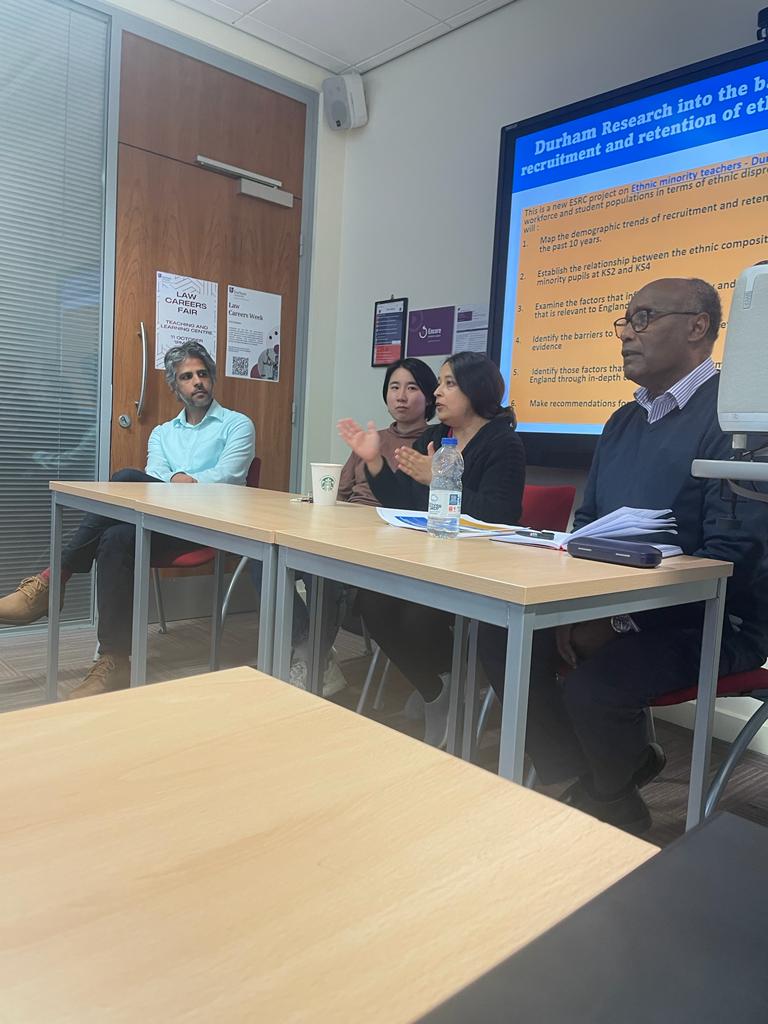Investigating the recruitment and retention of ethnic minority teachers, and its relationship to school outcomes
This is ESRC funded project in the stream of Education Research Programme 2022
Minority ethnic teachers bring different perspectives and life experiences, exposing our children to cultural diversity, which reflects the languages, cultures and ethnic background of the local community and society at large. To foster a diverse and inclusive society, it is imperative that staff of ethnic minority heritage should be represented across our schools, regardless of the demography of the school population, as this brings a rich cultural diversity to the school community, and fosters better understanding and tolerance among different groups of children. Addressing the mismatch between the teacher workforce and student populations matters for several reasons:
It can help address the low attainment of ethnic minority pupils, and second to create a more inclusive and diverse school
community that reflects the wider society. In national exams, such as the GCSE in England, the lowest attaining pupils are
the Gypsy/Roma and Irish travellers, followed by those from Black Caribbean background (DfE 2021). International
evidence suggests that exposure to teachers from a similar race/ethnicity provides minority ethnic students with a role
model that can help raise their aspiration and close the achievement gap. There is also evidence that increasing the
proportion of minority teachers in schools also leads to increased representation of ethnic minority students in gifted programmes, reduced exclusion and lower drop-out rates.
Minority ethnic teachers bring different perspectives and life experiences, exposing our children to cultural diversity, which
reflects the languages, cultures and ethnic background of the local community and society at large. To foster a diverse and
inclusive society, it is imperative that staff of ethnic minority heritage should be represented across our schools, regardless
of the demography of the school population, as this brings a rich cultural diversity to the school community, and fosters
better understanding and tolerance among different groups of children.
There is currently no robust comprehensive research into understanding how we could raise the number of ethnic minority
teachers in schools. Previous research tended to be small-scale or based on case studies, which are reliant on the
evidence of a self-selected group of individuals. Such findings can be biased as they are based on the voices of volunteers.
This new study will:
1. Map the demographic trends of recruitment and retention of minority ethnic teachers and pupils in England (for which
good quality data is available) over the past 10 years. This will give us a clearer picture of the growth of minority ethnic
student population vis-a-vis that of teaching staff
2. Establish the relationship between the ethnic composition of the teaching staff and the attainment of ethnic minority pupils
at KS2 and KS4
3. Examine the factors that influence the supply and attrition of ethnic minority teachers from international research that is
relevant to England
4. Identify the barriers to recruiting and retaining ethnic minority teachers in schools in England
5. Identify those factors that facilitate the recruitment and retention of ethnic minority teachers in schools in England
6. Determine promising approaches from international evidence to attracting and recruiting ethnic minority teachers,
relevant to England
7. Make recommendations for policy and practice on best practice and effective programmes to adopt
The study will analyse official government data from the School Workforce Census. UCAS and the NPD. It will
systematically review and synthesise international evidence on effective measures to attract and retain teachers. It will also
conduct a nationwide survey on barriers and facilitators faced by schools in recruiting and retaining teachers. This will be
supplemented by in-depth case studies of schools that have been known to be effective in recruiting and retaining ethnic
minority staff.
Project Presentation: Ethnic disproportionality in the schools of England
Stephen Gorard, Nadia Siddiqui, Yiyang Gao, Beng Huat See, Feyisa Demie and Antonina Tereshchenko
Durham University Evidence Centre for Education
Stephen Gorard, Nadia Siddiqui, Beng Huat See, Yiyang Gao
Durham University Centre for Education
Beng Huat See, Stephen Gorard, Yiyang Gao, Loraine Hitt, Nadia Siddiqui, Feyisa Demie, Antonina Tereshchenko, Nada El Soufi
Stephen Gorard, Yiyang Gao, Antonina Tereshchenko, Beng Huat See, Nadia Siddiqui, and Feyisa Demie
Durham University Evidence Centre for Education
Stephen Gorard, Yiyang Gao, Antonina Tereshchenko, Nadia Siddiqui, Beng Huat See and Feyisa Demie
Durham University Evidence Centre for Education
Working Paper 4: Factors influencing the recruitment and retention of ethnic minority teachers: A review of international
evidence
Beng Huat See, Stephen Gorard, Yiyang Gao, Hitt, L. Feyise Demie, Antonina Tereshchenko, Nadia
Siddiqui and el Soufi, N.
Durham University Evidence Centre for Education
Stephen Gorard, Yiyang Gao, Beng Huat See, Antonina Tereshchenko, Nadia Siddiqui, Feyisa Demie
Durham University Evidence Centre for Education
Stephen Gorard, Nadia Siddiqui, Beng Huat See, Antonina Tereschenko, and Feyisa Demie
Durham University Evidence Centre for Education
Working Paper 1:The disproportionality of ethnic minority teachers in England: trends, patterns,
and problems
Stephen Gorard, Wenqing Chen, Yiyi Tan, Carolina Gazmuri, Beng Huat See, Antonina Tereshchenko,
Feyisa Demie and Nadia Siddiqui
Durham University Evidence Centre for Education
s.a.c.gorard@durham.ac.uk
Events
Black History Month Seminar, 19 October 2023:
Research into barriers and and good practice in the recruitment and retention of ethnic minority teachers in England on Black History Month

Feyisa Demie, Nadia Siddiqui, Yiyang Gao, Johny Daniel


/prod01/prodbucket01/media/durham-university/departments-/education/Books-Banner.jpg)
/prod01/prodbucket01/media/durham-university/departments-/education/dece/teacherfile.jpg)